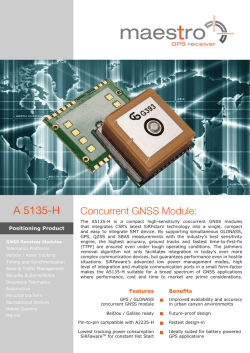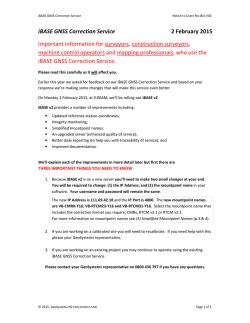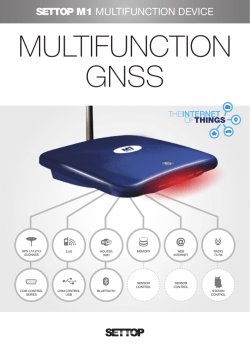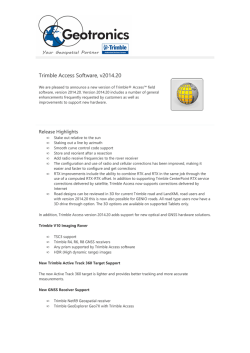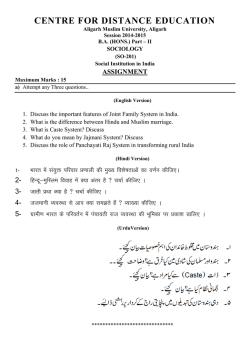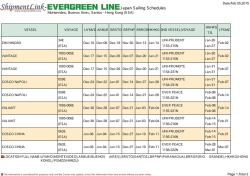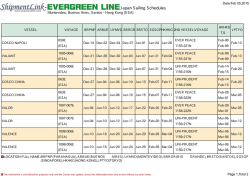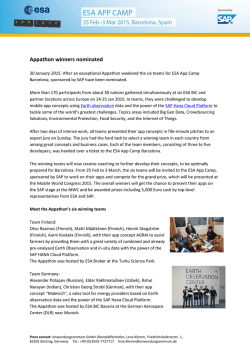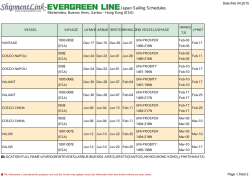
GNSS+R 2015
First Announcement 2015 Workshop on Reflectometry using GNSS and other Signals of Opportunity (GNSS+R 2015) May 11 – 13, 2015 GFZ Potsdam, Germany supported by ESA, GFZ, IAG, and Zeppelin NT Development of GNSS-R (Global Navigation Satellite Systems Reflectometry) remote sensing techniques for ground, airborne and space-based observation platforms started about two decades ago for altimetry. It is now the focus of international and interdisciplinary geophysical and engineering research with a broad spectrum of possible Earth observation applications. Reflectometry methods exploit propagation effects of GNSS signals or other signals of opportunity, multipath and surface/volume scattering to retrieve atmospheric and surface properties on regional and global scales. GNSS-R remote sensing exhibits unique characteristics to complement existing active and passive Earth Observation Systems. A major advantage is the use of an existing and fully operational GNSS positioning infrastructure, which consists of large receiver networks and other observation platforms, and also will include more than one hundred transmitting GNSS satellites in the near future. This infrastructure assures the continuity of the signals and also provides the foundation for potential operational applications in Earth Observation. Electromagnetic models for L-Band GNSS signals, reflected from water, ice, and land surfaces have been used to retrieve a variety of data products including ocean surface winds, sea surface height, soil moisture, ice properties, and vegetation biomass from ground, airborne and satellite platforms. The development of GNSS-R has been stimulated in recent years by a few satellite missions in preparation, all focused on ocean remote sensing on a nearly global scale. A GNSS-R experiment will be conducted on the UK TechDemoSat-1, starting in 2014 and 3Cat-2, a cubesat mission, scheduled for launch in 2015. NASA plans to launch the eight satellite CYGNSS (CYclone GNSS) constellation in 2016. ESA has funded activities related to the PARIS In-Orbit Demonstrator (PARIS-IOD) and recently initiated international industrial and scientific studies to install a GNSS-R experiment aboard the International Space Station (GEROS-ISS, GNSS rEflectometry Radio Occultation and Scatterometry aboard ISS) with planned launch in 2019. Following this early success in the re-utilization of ubiquitous, stable GNSS signals, recent experiments have further demonstrated reflectometry using digital communication satellite signals, expanding these methods to the full range of microwave frequencies capable of penetrating the Earth’s atmosphere. The development of reflectometry with GNSS and other signals of opportunity (GNSS+R) in many ways parallels the prior development of the GNSS radio occultation (GNSS-RO) technique for precise atmosphere sounding on a global scale. GNSS-RO has been contributing to improved global numerical weather forecasts since 2006. In addition the data are currently widely used for numerous applications in atmospheric and climate research with a continuously increasing number of applicants. The goal of this workshop is to bring together the leading experts and young researcher working in the science and engineering of reflectometry, or related fields, with scientists interested in their applications to stimulate international scientific exchanges and to further support the development of this emerging technology as a powerful remote sensing tool. Therefore we invite contributions that focus on all aspects of the development as well as the broad spectrum of applications of GNSS+R techniques. The GNSS reflectometry workshop (GNSS+R 2015) will be held at the German Research Centre for Geosciences GFZ in Potsdam during May 11–13, 2015. GFZ is one of the leading geoscience institutions with history spanning 150 years. GFZ scientists helped pioneer the application of GNSS RO techniques and are currently significantly contributing to the development of GNSS reflectometry. GNSS+R 2015 Workshop Topics: Science applications on ocean, land, vegetation, cryosphere, and atmosphere Theoretical aspects, model development and recent advances in data analysis Instruments and integration with data of other sources Ground and flight experiments New and recent satellite mission concepts Details of the scientific program and logistics can be found on the conference web-site: www.gnssr2015.org. Deadline for abstract submission is January 30th 2015. Scientific organizing committee Jens Wickert GFZ, Potsdam, Germany Adriano Camps UPC-Barcelona Tech/IEEC, Barcelona, Spain Estel Cardellach ICE-CSIC/IEEC, Barcelona, Spain James L. Garrison Purdue University, U.S. Christine Gommenginger NOC, Southampton, UK Shuanggen Jin SHAO, Shanghai, China Kristine M. Larson University of Colorado, Boulder, U.S. Manuel Martin Neira ESA, Noordwijk, Netherlands Nazzareno Pierdicca Università di Roma La Sapienza, Italy Martin Unwin SSTL, UK Valery Zavorotny NOAA/ESRL, Boulder, CO, U.S. Cinzia Zuffada JPL/Caltech, Pasadena, U.S. Local organizing committee at GFZ Jens Wickert Sibylle Vey Jamila Beckheinrich Georg Beyerle Katrin Gundrum Maximilian Semmling Kirstin Winkler
© Copyright 2026
